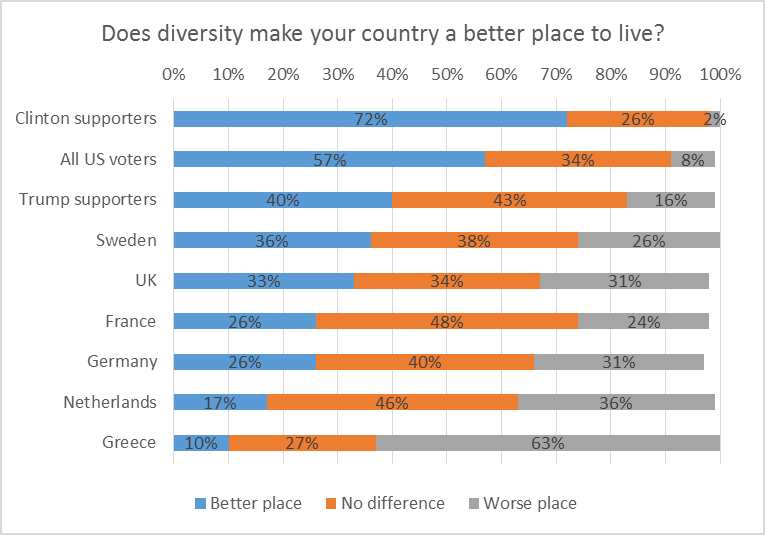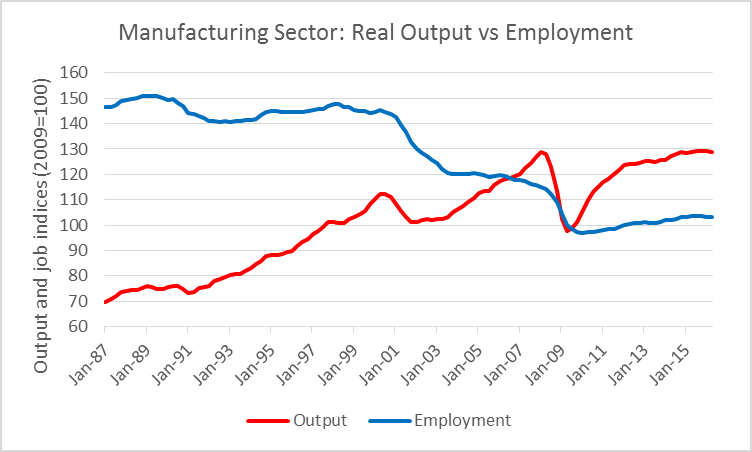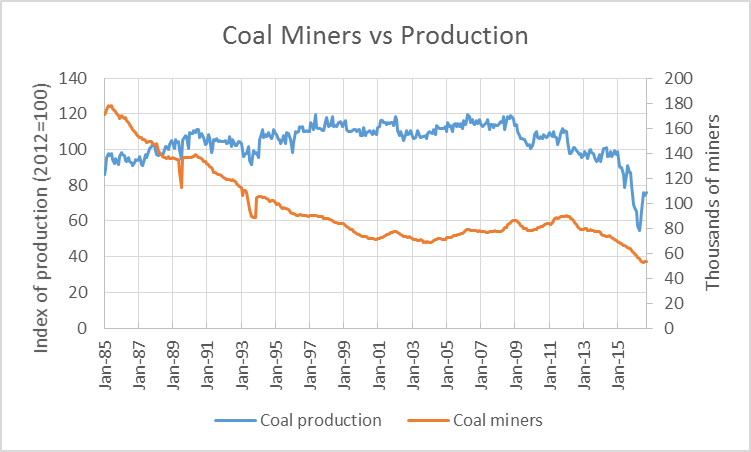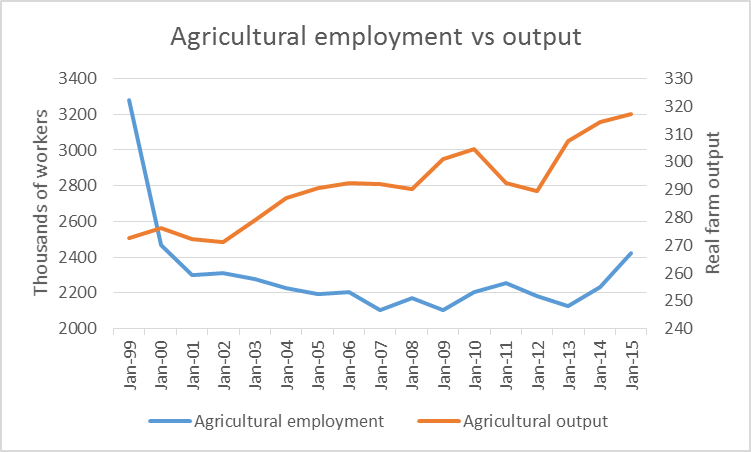Trump’s Politics of Pessimism
The data show his supporters are very pessimistic. How will he meet their needs?
With Donald Trump’s victory, the question arises as to what policies his administration will follow. Given the many contradictions in his proposals, and his apparent lack of interest in policy, any predictions are as likely to be risky as those about the outcome of the election.
What is clear is the remarkable pessimism of the Trump supporters, the people who turned out in numbers that fooled the pollsters. Two polls, one by Pew Research and the other by PPRI and Brookings, taken shortly before the election attempted to understand the Trump and Clinton supporters. Their conclusions were remarkably similar.
The answers to two questions in an August poll from Pew illustrate the Trump pessimism. The first shows how the Trump supporters — those voting for him in the Republican primary — believe America has gone downhill.
The second illustrates Trump supporters’ pessimism about the future:
Among the three largest ethnic groups, as the next graph shows, African Americans are the most optimistic Americans, whites are the least and Hispanics fall in the middle. This strikes many people (including Trump himself–with his “What do you have to lose?” message to black voters) as strange because this ranking reverses standard measures of welfare which show whites do best and blacks worst. However, it fits recently-uncovered statistics on worsening death rates in middle-aged working-class whites, primarily due to self-inflicted causes, such as suicide, excessive drinking, and drug abuse. Happiness may depend more on one’s perception of trends than of absolute positions.
Trump has helped create a remarkable switch in Republican attitudes about free trade. The next chart compares the attitude of Republicans in May 2015, the month before Trump entered the presidential race to their response this August. Trump has completely reversed the previous Republican support for foreign trade agreements:
It is no surprise that Trump supporters do not like the Trans-Pacific partnership. More surprising is that a majority of Clinton supporters continue to support the TPP, disagreeing with Clinton and Bernie Sanders.
As expected Trump supporters are less supportive of diversity than are Clinton supporters. Even so, they are more supportive of diversity than are the citizens of every European country studied, according to a separate Pew study:
Other results are pretty much what one might expect. Compared to Clinton supporters, Trump supporters are much more concerned about immigration and terrorism and much less about the gap between rich and poor and the condition of the environment.
As soon as the election results were published, Wisconsin’s Paul Ryan claimed that they represented a “mandate.” Because Trump, unlike Clinton, never presented a coherent set of policies, presumably the mandated policies will be supplied by Ryan.
When newspapers publish maps of the election results, they show a sea of red surrounding blue islands, the urban areas. For all their challenges, most cities are prospering, particularly on the coasts. Even in the Rustbelt, cities like Milwaukee are making a transition.
Many of the areas choosing Trump have been hard hit by changes in the economy. For instance, a majority of Wisconsin’s less-populated counties continue to lose population. While there are some long-time Republican areas that continue to prosper, such as the counties surrounding Milwaukee, the traditionally Democratic areas that switched to Trump are genuinely hurting.
There are reasons to doubt Trump will be successful in addressing the causes of his supporters’ pessimism. For starters, it’s unclear he understands the problem. Take manufacturing. During the campaign Trump repeatedly claimed that the US has stopped making things. Yet since 1987, the real output (red line) of American manufacturers has almost doubled, while around a third of manufacturing jobs have disappeared.
The problem is that US manufacturing has continuously looked for ways to do more, to produce more efficiently. This is how the market is supposed to work.
Trump suggests the whole problem is because countries like China are cheating and seems to proposing the erection of various barriers to trade. This threatens to set off a trade war. More immediately it is very hard to erect a barrier on one import while leaving others alone. An example is the last Bush administration’s attempt to help the American steel industry by placing tariffs on imported steel. This put American users of steel, such as the Wisconsin lawnmower industry, at a competitive disadvantage, because their foreign competitors benefited from lower cost steel.
A trade war with China could hurt American business in other ways. As with the Bush steel tariff, it could raise the costs of materials used by American manufacturers. It could also help shut off the Chinese market for American products and services.
Another group that has been hurting—which Trump has promised to help—are coal miners and the regions dependent on them, including Appalachia and some Western states. As the next chart shows, the number of miners (red line) dropped in half long before there was any talk of a “war on coal” or climate change. Again, the major cause was technology: fewer workers were needed. The growing use of surface mining and less underground mining also played a role.
The recent decline in mining jobs has causes beyond the concern about global warming. These include lower costs of gas resulting from fracking and the continual cost reductions in solar and wind power. China, by far the largest coal user, has been trying to reduce coal burning to fight dangerous air pollution in its cities.
Agriculture is the classic example of an industry in which output has increased while employment has decreased, a process that has been going on for centuries. It is also a major American exporter and potential victim if Trump triggers a trade war. The chart below shows the number of farm workers since 1948, but the decline started much earlier. As with manufacturing, the root cause is technology. Farms have gotten larger to support the increasing investment in equipment.
Today, as the next chart shows, farm output has continued to grow, while the number of workers has shrunk to around two million. As a result, rural counties are losing population. Fewer workers means lower business in the towns and the young people move elsewhere. (Note: I have been unable to find any explanation for the huge reported decline in farm employment that occurred from 1999 to 2001. At two million, agricultural employment is now so low it is not given a lot of attention.)
Republicans have long positioned themselves as the “free market” party. When it comes to global trade, Trump has shifted that role to the Democrats.
Free market enthusiasts like to talk about “creative destruction.” The market constantly chews up and renews the economy. In the long run, this process creates more prosperity: more manufactured goods and agricultural products at lower cost, or energy with less environmental cost. But this process has a human cost, particularly in the destruction of existing jobs. Trump’s supporters appear to include a heavy proportion of the victims of the free market.
Trump has been remarkably secretive about his business career, reflected in his refusal to release his tax returns. Perhaps one reason for his reluctance is that the returns would confirm the impression that he has prospered at the expense of people who invested in his businesses, whether suppliers and contractors on his building projects, students at Trump University, investors in his Atlantic City casinos, or those who bought shares in the Toronto Trump Tower, which recently plunged into receivership.
Will that pattern be repeated in the Trump presidency? Or will he remember the pain of the people who elected him?
Data Wonk
-
Why Absentee Ballot Drop Boxes Are Now Legal
 Jul 17th, 2024 by Bruce Thompson
Jul 17th, 2024 by Bruce Thompson
-
The Imperial Legislature Is Shot Down
 Jul 10th, 2024 by Bruce Thompson
Jul 10th, 2024 by Bruce Thompson
-
Counting the Lies By Trump
 Jul 3rd, 2024 by Bruce Thompson
Jul 3rd, 2024 by Bruce Thompson
































And that is exactly why, that no matter how much in your heart or your head you may have wanted change in this election cycle, you should not have executed on that desire with Donald Trump. He may not be so dangerous alone (though he probably is that too), but he’s really dangerous given who he’s gravitated towards or already chosen for an inner circle and for the complete lack of any check-or-balance he’d be against the very worst elements of the rest of the Party (yes, Ryan, I’m talking about you).
Data Wonks this is a great article thank you for your work. The Clinton and Trump messages were distinctly different. Hillary seemed like she was serving Obama’s left overs to unenthusiastic voters, where as Trump whether you love him or hate him was delivering red meat. I think Michigan sums it up best. Ford Company decides to invest $1.6 billion and 2800 jobs and ship all small cars American divisions to Mexico. Which on paper makes sense. Mexican labor is cheaper and the Mexican consumer may be more persuaded to buy a small car verses an American SUV. Candidate Trump marches to Michigan and looks those union households in the eye and promises a tax on all Ford cars in Mexico of 30 percent. The message resonates union house holds go with Trump and the college educated management flocks to Clinton.
I agree with your assessment Jason, but those voters are going to be awfully disappointed when they realize Trump can’t bring jobs back to their communities despite his promises. Then what?
Vince, all Trump can really do is talk to Ford executives and possibly make a business friendly environment for all companies. It seems every month a Corporation moves to Ireland or jobs go elsewhere. I do not think Americans understand that where ever they work or what they do that it is not their job. The best you can do is get training, education and market yourself. Ford Company is in many ways a heroic company. They didn’t take the bail out that GM and Chrysler received. GM and Chrysler on paper are stronger Companies now. In the end what is more important Ford surviving as a company with roots in Mexico and the United states or that workers job in Michigan.
Sure but we’re not just talking about Michigan and automotive industry jobs here. And it’s not like a business friendly environment is anything new or revolutionary. He can’t bring back manufacturing jobs and he can’t magically revive the coal mining industry. So it will be interesting to see what those voters do when that reality sinks in. A lot of promises were made to them.
Your right. This does not seem to be the Republican party from 2012. The era of Reagan is dead and this is now the party of Trump. In the end, if Trump wants to be viable in 2020 he needs to do a few things. One, stay out of foreign wars. Two, connect with Latinos which to me means create a better jobs environment for the many small businesses run by Latino’s. Three, do everything you can to prevent the next bear market(good luck). Four, don’t touch Social Security. Five, attempt to make inroads into urban cities (tax breaks for impoverished areas). Six, enhance boarder security but leave deportation alone, unless the person is a felon. Seven, always talk up America as an inclusive country.
That’s pretty sensible. If he makes Kris Kobach Attorney General and gives jobs to the likes of Frank Gaffney or Sheriff Joe, you can kiss two, six, and seven goodbye. We shall see. I also wonder how long it will take for him to get bored and just let Pence do everything.
This is the same old Republican party. It’s somehow new that Republican voters are pessimistic? C’mon, Republicans just rattle the cage if they’re down in a race, to literally “scare up” the voters.
Also, when you campaign on “government is inept”, when you screw up in office or don’t do your job, this doesn’t turn away voters. It literally makes Republican voters feel good about themselves, because they “knew” all along that it would happen… and keep voting for Republicans that validate their view.
Democrats cannot win the electorate by advocating good policies, our democracy has regressed and Democrats need to re-learn how to win elections. The governance is really an afterthought to the electorate at this point.
Pessimism is pathological. The pessimists I Know are not looking for things to get better. Their egos are gratified by being the Righteous Wronged. They enjoy and seek things to complain about. Somehow he convinced them to vote and convinced the economically downtrodden that he would fix things for them. The Pessimists will be disappointed to find Pres. Trump is NOT Candidate Trump.
Trump’s second wife (Marla Maples) said he always kept a book of Adolph Hitler’s speeches in his bedside table. He learned a lesson from reading these: It is far easier to motivate most people to do something by appealing to their base instincts rather than their better nature. Trump lied his way into the White House, and now must deal with the consequences of his false promises. When Medicare and Social Security are privatized, (hugely popular programs) with nothing done to bring back manufacturing jobs, in a few years the voters he captured by appealing to their dark angels will become aware they have been betrayed. It’ is going to be hard to blame the Democrats for what is about to happen when they control absolutely nothing going forward.
Re: Daniel Golden’s #10: A telling anecdote. If true, that Hitler book is one of the few that Trump has ever read in depth. According to Tony Schwartz, Trump’s co-author of “The Art of the Deal,” Trump had not read a full book in decades.
Trump has said he scans books rather than reading them. In one of his books he said “shallowness” was one of his best traits because he did not get bogged down by details.
On the other hand maybe Democrats are to optimistic. Can you imagine what it is like to be Wisconsin Democratic Chairperson Martha Laning on election night? Did Hillary operative Rob Mook call her to find out if every think is okay Wisconsin? Hey, Rob every thinks a ray of sunshine up here. We have never Trumper’s eveywhere and the last Marquette Poll had Hillary up 6 points. Now, Rob on the last day of the poll Donald Drumpf was tied with Hillary but we consider that day as an outlier.
Thank you, Bruce, for another data based essay. I respect your research, and I appreciate most of the conclusions you derive from that research. One of those conclusions, however, I consider incomplete. Trump’s appeal to those who despise “elites” does not satisfactorily define these “elites.” Whereas the OCCUPY WALL STREET movement identified elites as the 1% of the wealthiest among us prosper in all circumstances – especially when the rest of us suffer, Trump (certainly an elite by birth) identified elites as people who read the NY Times, people who read for understanding, people who read …
Consider Daniel’s post # 10 re the allegation of one of Trump’s former wives on how he kept a Hitler tome at his bedside and Virginia’s post # 11 re reports that Trump “had not read an entire book in decades,” and remember how Hitler turned the ignorant against the alleged elites in Germany in the 1930’s.
Dictators customarily promise to empower the ignorant at the expense of elites. Those they define as elites are customarily those who are better educated. Trump won the stupid vote going away. Elite by birth, W defeated the obviously more intelligent Al Gore and John Kerry largely by persuading stupid voters that he was a REGULAR GUY. College dropout Scott Walker defeated a man who clearly knew more about history, sociology, law and literature than he did + a woman with an MBA and success in business by portraying them as elites.
We need to stop voting for people who dismiss their opponents as too smart. If we do not respect better educated candidates, we will continue to elect less educated candidates; thereby dumbing down our leadership.